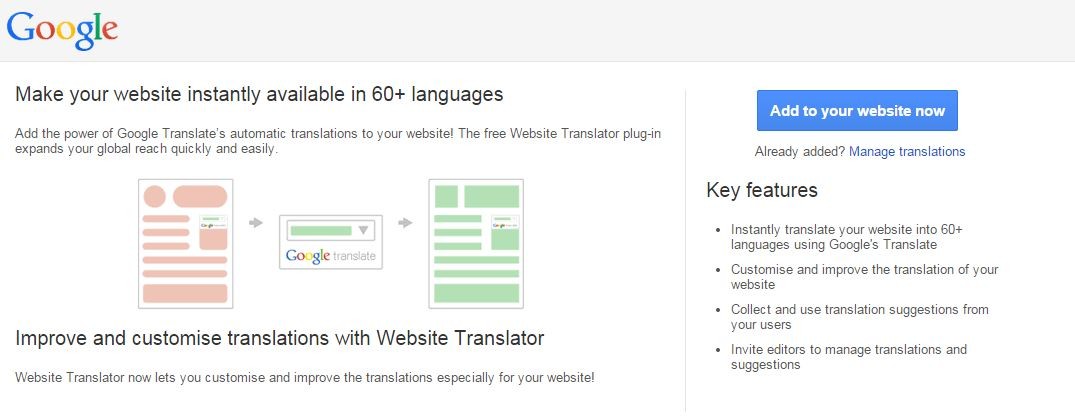What does using Google Translator mean for my website?
22nd January 2015

Let’s imagine your website is doing well with online sales and revenue is rapidly increasing. You start getting enquiries from visitors in other countries, in their own language, which you don’t quite understand. You would be forgiven for thinking the easiest and most obvious solution would be to use Google Translate – just to get the gist of what the enquiry is about … The ‘English’ Google Translate provides isn’t perfect but it’s okay. Then you either reply in English or you switch the language pair and get Google Translate to ‘translate’ again before sending your reply in their language. If these overseas enquiries keep coming, you may decide to translate your website into a foreign language – to reach this foreign audience faster and provide better customer service.
Google can ‘translate’ your website free-of-charge, so you decide to use Google Translate for the whole website; you think this will not only save you money, but also the time you would have spent searching for a translation agency and then updating your on-site content, in conjunction with them. A few weeks later you experience an abrupt drop in enquiries. You could start with asking your contacts or friends, to get their opinion on the matter, but let us save you time and tell you the truth – your ‘free translation’ is completely incomprehensible and utter gibberish.
What is Google Translate?
Google Translate is a statistical machine translation engine that looks for patterns in millions of documents and selects the best ‘translation’ it can find. It generates an artificially intelligent guess. Some of the guesses are more intelligent than others. The reason is that, by definition, it struggles with the finer nuance and meaning of language. In other words, your website, which is designed to attract customers, may make no sense at all and will actually be repelling your audience. Would you buy from a website written in very poor English? Would it give you the confidence you need to input your credit card details?
I’m guessing your answer is “No”.
A survey about language use and the internet, conducted by UKTechTrans, found that:
• English is not the most popular language in the world. It sits in the shadows of Mandarin in terms of active users.
• 70% of the world doesn’t speak English yet 57% of websites contain only English.
• Half of all Google searches are in languages other than English.
• 90% of internet users in the EU claim that, when given a choice of languages, they always choose to visit a website in their own language. Only half are happy using an English language website, even where there is no other alternative.
Of course, there are many reasons why you may experience a dip in enquiries and / or sales; but poor translation lacks credibility and can only indicate a low quality website. Language can be a massive barrier when it comes to making a sale. The Common Sense Advisory studied the effect of this on sales of products in the instructive report called ‘Cant’ Read, Won’t Buy’ and found that 85% of all consumers will not make a purchase if information is not readily available in their native language.
Google invests a lot of money into its own translation tool, but the search engine provider does not want you to use it for translating pages. Large chunks of machine translated text that hasn’t been reviewed by a human translator will make little or no sense to visitors and Google doesn’t want that kind of experience scattering its results pages.
Although the Google translate tool is very useful it doesn’t change anything on your website which Google the search engine will see. This means that the translated content it creates in every possible language, isn’t indexed in Google’s results and so does not help you to become findable in the search results when someone searches for you in French, for example.
Research conducted by Common Sense’s Advisory last year shows that:
“87% of consumers who can’t read English don’t buy products or services at English-language websites.”
This report was based on a survey of 3,002 consumers, in non-English-speaking countries, in locations such as Brazil, China, Egypt, France, Germany, Indonesia, Japan, Russia, Spain, and Turkey. As stated above, the research found that 87% of consumers who can’t read English don’t buy products or services at English-language websites. 87%!
In addition, 55% of those with a good understanding of English will still, only, buy from a website in their own language.
In conclusion; if you want to increase your international sales, do not be tempted by the perceived short-term benefits of using ‘free’ services, such as Google Translate, to create your international content. A well-researched translation, undertaken by a professional linguist, will always prove to be the more profitable option in the long- run (and the short and middle!).
If you are unsure on what to do next, contact us here and we’ll ensure you get the best professional advice on how you need to plan your, successful, international campaign.
We’ll also make the process as easy as possible for you – so you can focus on doing what you do best – running your business.
References:
http://www.commonsenseadvisory.com/
https://support.google.com/webmasters/#topic=3309469
